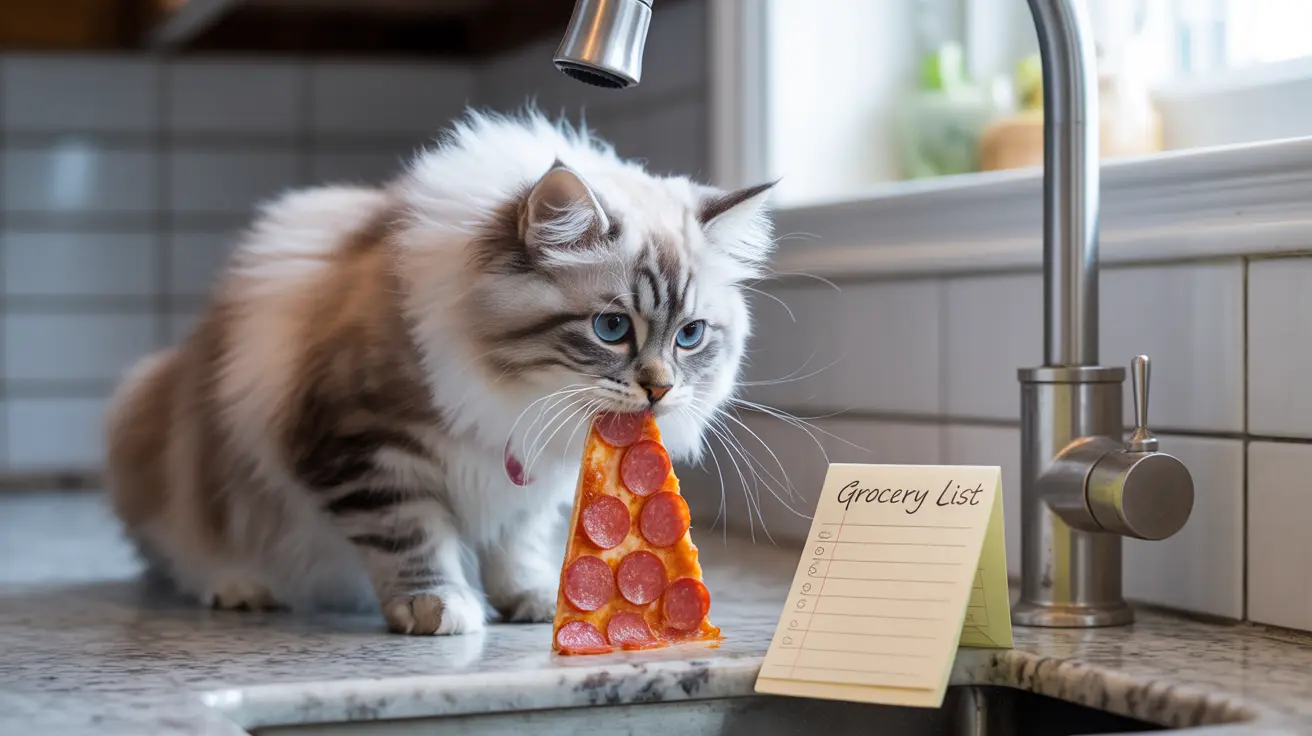If you've ever enjoyed a slice of pizza or charcuterie, you might have wondered if sharing a piece of pepperoni with your feline friend is safe. The short answer is no - cats should not eat pepperoni. This popular cured meat contains several ingredients that can be harmful or even toxic to your cat's health.
In this comprehensive guide, we'll explore why pepperoni is dangerous for cats, what can happen if they eat it, and what you should do if your cat manages to sneak a bite.
Understanding the Dangers of Pepperoni for Cats
Pepperoni might seem like a harmless treat, but this cured meat is packed with ingredients that can seriously harm your cat. As a processed meat product, pepperoni contains excessive amounts of salt, fat, preservatives, and potentially toxic spices that aren't compatible with feline physiology.
Critical Health Risks of Pepperoni Consumption
Salt Toxicity
One of the biggest dangers of pepperoni is its extremely high sodium content. A single ounce of pepperoni contains nearly 476mg of sodium - more than 11 times what a cat should consume in an entire day. This excessive salt intake can lead to serious health complications, including:
- Severe dehydration
- Kidney damage
- Sodium ion poisoning
- High blood pressure
Dangerous Fat Content
Pepperoni's high fat content poses another significant risk. With over 12 grams of fat per ounce, it contains more than twice the recommended daily fat intake for an average cat. This excessive fat can cause:
- Acute pancreatitis
- Obesity
- Digestive upset
- Long-term metabolic issues
Toxic Ingredients and Additives
Pepperoni contains several ingredients that are known to be toxic to cats:
- Garlic and onion powder (can cause anemia)
- Nitrates and nitrites (harmful preservatives)
- Black pepper and red pepper flakes (digestive irritants)
- Various spices that can cause gastrointestinal distress
What to Do If Your Cat Eats Pepperoni
If your cat manages to eat pepperoni, the severity of the situation depends on how much they consumed and their individual sensitivity. Here's what you should do:
- Assess the amount eaten
- Monitor for immediate symptoms
- Contact your veterinarian if you notice:
- Vomiting or diarrhea
- Excessive thirst
- Lethargy
- Unusual behavior
- Loss of appetite
Safe Alternatives to Pepperoni
Instead of pepperoni, consider these healthy treat options for your cat:
- Plain, cooked chicken or turkey pieces
- Commercial cat treats
- Freeze-dried meat treats specifically made for cats
- Small pieces of plain, cooked fish
Frequently Asked Questions
Can cats eat pepperoni safely or is it harmful to them?
No, cats cannot safely eat pepperoni. It contains dangerous levels of salt, fat, and toxic ingredients that can cause serious health problems in cats.
What health risks does pepperoni pose to cats if they eat it?
Pepperoni poses multiple health risks including salt poisoning, pancreatitis, anemia (from garlic and onion), and severe digestive issues. The high fat and sodium content can also lead to obesity and kidney problems.
What are the symptoms of salt poisoning or toxicity from pepperoni in cats?
Symptoms include excessive thirst and urination, vomiting, diarrhea, lethargy, tremors, seizures, and loss of coordination. In severe cases, it can be fatal.
What should I do if my cat accidentally eats pepperoni?
Monitor your cat closely for adverse reactions and contact your veterinarian immediately if you notice any concerning symptoms. The severity depends on the amount consumed and your cat's size.
What are safe and healthy treat alternatives to pepperoni for cats?
Safe alternatives include plain cooked meats (chicken or turkey), commercial cat treats, and specially formulated freeze-dried meat treats designed specifically for cats.
Remember, while it might be tempting to share human foods with your cat, it's always best to stick to veterinarian-approved treats and foods specifically formulated for feline health and safety.






